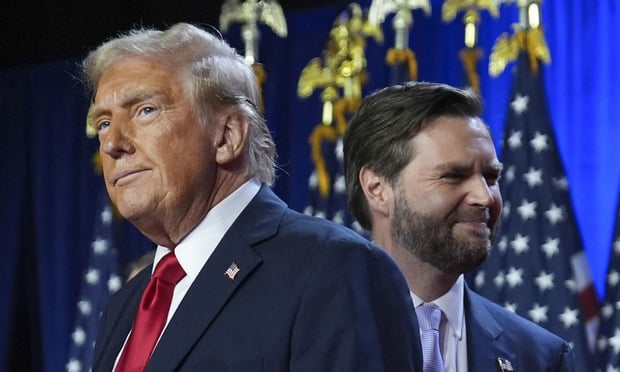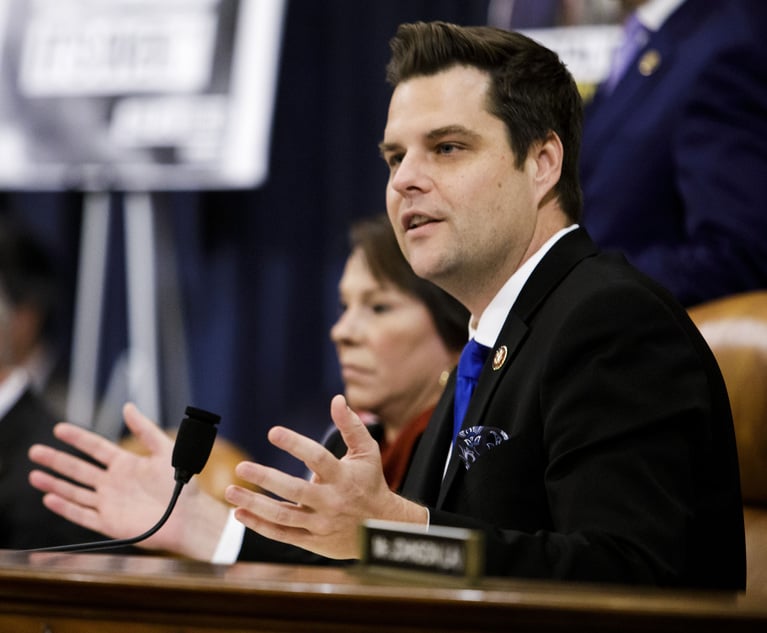Cherokee Nation Vows to Keep Up Fight vs. Pharma Over Opioids Despite Legal Setback
After a federal judge ruled that the tribal court does not have jurisdiction over the Cherokee Nation's lawsuit against several pharmaceutical distributors and retail pharmacies over the opioid addiction epidemic, the territory's attorney general has vowed to continue the legal battle by refiling the case in state court.
January 11, 2018 at 01:42 PM
3 minute read

After a federal judge in Oklahoma ruled this week that the tribal court does not have jurisdiction over the Cherokee Nation's lawsuit against several pharmaceutical distributors and retail pharmacies over the opioid addiction epidemic, the territory's attorney general has vowed to continue the legal fight.
Judge Terence Kern of the Northern District of Oklahoma in Tulsa late Tuesday issued a preliminary injunction preventing the case from proceeding in tribal court. Cherokee Nation AG Todd Hembree brought the suit against drug distributing giants like McKesson Corp. and retail pharmacies such as CVS Health, Walgreen Co. and Wal-Mart Stores Inc. in April , alleging that the companies violated tribal and federal laws by turning a blind eye as prescription painkillers from the illicit black market flooded the streets of the Cherokee Nation.
The defendant companies responded with the Tulsa federal court lawsuit in June, filing a new complaint alleging that the District Court of the Cherokee Nation does not have jurisdiction to civilly enforce the federal Controlled Substances Act; nor does the companies' alleged behavior “threaten either tribal governance or internal relations among tribe members”—an argument that the court bought.
“While noting [Cherokee Nation's] evidence of the harm opioid abuse has caused to individual tribal members and families, and costs borne by the tribe, the Court cannot plausibly find that such harm is 'catastrophic for tribal self-government,'” Kern wrote in the 25-page ruling.
“The lack of tribal court jurisdiction over this matter is clear, and it would not serve the public interest to require [the health care companies] to litigate through the tribal court system before challenging jurisdiction in this Court. Accordingly, the Court finds that the public interest favors an injunction.”
On Wednesday, Hembree issued a statement promising to refile and “hold these companies accountable in state court.”
“The opioid crisis in the Cherokee Nation was fueled by the defendants' decision to prioritize profits over the well-being of Cherokee citizens,” according to the statement. “The defendants knowingly turned a blind eye to the harm they caused and have not changed their conduct, but this cycle ends now.”
The Cherokee Nation lawsuit came amid a growing wave of plaintiffs lawyers joining state and local governments in filing lawsuits against Big Pharma, blaming it for inundating the country with highly addictive painkillers such as OxyContin and Percocet, thereby playing a significant role in the nationwide prescription opioid and heroin addiction epidemic. For instance, 18 Connecticut municipalities filed a lawsuit Tuesday in state Superior Court against several pharmaceutical companies alleging they concealed the risk of opioid addiction from the public.
But unlike the suits in other jurisdictions—including Ohio, dozens of New York counties, Mississippi, New Hampshire, Chicago and two California counties—this one doesn't go after big pharmaceutical manufacturers for the allegedly deceptive marketing of their drugs. Rather, it names as defendants the drug distributors and is the first to rope in the retail pharmacies.
The lawsuit is captioned McKesson Corp. et al. v. Hembree et al.
This content has been archived. It is available through our partners, LexisNexis® and Bloomberg Law.
To view this content, please continue to their sites.
Not a Lexis Subscriber?
Subscribe Now
Not a Bloomberg Law Subscriber?
Subscribe Now
NOT FOR REPRINT
© 2024 ALM Global, LLC, All Rights Reserved. Request academic re-use from www.copyright.com. All other uses, submit a request to [email protected]. For more information visit Asset & Logo Licensing.
You Might Like
View All

'Sharp and Profound' Policy Shifts Prompt DC Law Firms to Evaluate Opportunities, Challenges
5 minute read
Trump Likely to Keep Up Antitrust Enforcement, but Dial Back the Antagonism
5 minute readTrending Stories
- 1Elon Musk Names Microsoft, Calif. AG to Amended OpenAI Suit
- 2Trump’s Plan to Purge Democracy
- 3Baltimore City Govt., After Winning Opioid Jury Trial, Preparing to Demand an Additional $11B for Abatement Costs
- 4X Joins Legal Attack on California's New Deepfakes Law
- 5Monsanto Wins Latest Philadelphia Roundup Trial
Who Got The Work
Michael G. Bongiorno, Andrew Scott Dulberg and Elizabeth E. Driscoll from Wilmer Cutler Pickering Hale and Dorr have stepped in to represent Symbotic Inc., an A.I.-enabled technology platform that focuses on increasing supply chain efficiency, and other defendants in a pending shareholder derivative lawsuit. The case, filed Oct. 2 in Massachusetts District Court by the Brown Law Firm on behalf of Stephen Austen, accuses certain officers and directors of misleading investors in regard to Symbotic's potential for margin growth by failing to disclose that the company was not equipped to timely deploy its systems or manage expenses through project delays. The case, assigned to U.S. District Judge Nathaniel M. Gorton, is 1:24-cv-12522, Austen v. Cohen et al.
Who Got The Work
Edmund Polubinski and Marie Killmond of Davis Polk & Wardwell have entered appearances for data platform software development company MongoDB and other defendants in a pending shareholder derivative lawsuit. The action, filed Oct. 7 in New York Southern District Court by the Brown Law Firm, accuses the company's directors and/or officers of falsely expressing confidence in the company’s restructuring of its sales incentive plan and downplaying the severity of decreases in its upfront commitments. The case is 1:24-cv-07594, Roy v. Ittycheria et al.
Who Got The Work
Amy O. Bruchs and Kurt F. Ellison of Michael Best & Friedrich have entered appearances for Epic Systems Corp. in a pending employment discrimination lawsuit. The suit was filed Sept. 7 in Wisconsin Western District Court by Levine Eisberner LLC and Siri & Glimstad on behalf of a project manager who claims that he was wrongfully terminated after applying for a religious exemption to the defendant's COVID-19 vaccine mandate. The case, assigned to U.S. Magistrate Judge Anita Marie Boor, is 3:24-cv-00630, Secker, Nathan v. Epic Systems Corporation.
Who Got The Work
David X. Sullivan, Thomas J. Finn and Gregory A. Hall from McCarter & English have entered appearances for Sunrun Installation Services in a pending civil rights lawsuit. The complaint was filed Sept. 4 in Connecticut District Court by attorney Robert M. Berke on behalf of former employee George Edward Steins, who was arrested and charged with employing an unregistered home improvement salesperson. The complaint alleges that had Sunrun informed the Connecticut Department of Consumer Protection that the plaintiff's employment had ended in 2017 and that he no longer held Sunrun's home improvement contractor license, he would not have been hit with charges, which were dismissed in May 2024. The case, assigned to U.S. District Judge Jeffrey A. Meyer, is 3:24-cv-01423, Steins v. Sunrun, Inc. et al.
Who Got The Work
Greenberg Traurig shareholder Joshua L. Raskin has entered an appearance for boohoo.com UK Ltd. in a pending patent infringement lawsuit. The suit, filed Sept. 3 in Texas Eastern District Court by Rozier Hardt McDonough on behalf of Alto Dynamics, asserts five patents related to an online shopping platform. The case, assigned to U.S. District Judge Rodney Gilstrap, is 2:24-cv-00719, Alto Dynamics, LLC v. boohoo.com UK Limited.
Featured Firms
Law Offices of Gary Martin Hays & Associates, P.C.
(470) 294-1674
Law Offices of Mark E. Salomone
(857) 444-6468
Smith & Hassler
(713) 739-1250








